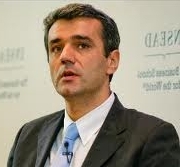By Alfred Tuinman
- 3 minutes read - 460 wordsEdited on March 21, 2023
Prof. Ilian Mihov
Pff isn’t it annoying if you cannot find a particular article or email? I just searched all over the place for a reference to the YouTube clip I had watched yesterday but to no avail. At least until eventually I stumbled upon the story.
To my delight it was even a better version as this one showed the graphs. The talk had been on the emerging economies and whether they will overtake the western world. I had seen data from the ING before showing that both India and China will overtake the west in a few decades. The gist of the story as conveyed by the Bulgarian professor Ilian Mihov however was most interesting.
The professor claimed that an emerging economy can increase rapidly only up to a certain point. Initially this can be fast due to imitation but then the speed reduces with time and can only increase by a peculiar figure of 1.85% due to innovation.
However, and this is where it really got interesting and I straightened myself in my chair. As you may know, every five years the World Bank benchmarks the ease of doing business in the world. A country with a high ranking on the ease of doing business means the regulatory environment is more conducive to the starting and operation of a local firm.
Professor Mihov then went on to state that if the World Bank ranking is low, i.e. the regulatory framework is not conducive, then the economy cannot grow beyond a certain point and will, in effect, stagnate. As an example he gave Venezuela. This year China ranks 79 and India ranks 134, just above the West Bank.
Why did I recall this lecture by professor Mihov suddenly? It was a few years ago that I was invited to attend the* International Leadership Symposium on Ethics in Business* in the European parliament. With me being based in India these days I could not muster the time to travel to Europe for this otherwise noteworthy event. H.H. Sri Sri Ravi Shankar, founder of the International Association for Human Values and co-founder of WFEB said this year that
“The basis of ethics is economy. You can’t have ethics in a society which is poor. The ethics is economy and the basis of economy is the state and the basis of state is civil society. We need to look at it as a circle.”
In other words he supported the view of professor Mihov that if we, as part of the civil society, encourage the ethics of the state we can increase the wealth of our economy as measured in GDP. We don’t have to work harder at our work, we have to work harder to get a better government…